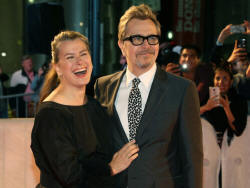|
 'Darkest
Hour' offers a timely study into Churchill's leadership 'Darkest
Hour' offers a timely study into Churchill's leadership
 Send a link to a friend
Send a link to a friend
[September 13, 2017]
By Solarina Ho
TORONTO (Reuters) -
"Darkest Hour," a new film about Winston Churchill's
early days as Britain's Prime Minister during World War
Two, looks at the importance of leadership and
prescience in turbulent times, said British actor Gary
Oldman, who plays Churchill.
|
|
 Oldman, 59, one of Britain's most versatile
actors, said he was initially hesitant to take the role given
the larger-than-life character and the great actors who have
already portrayed Churchill, including Albert Finney, Richard
Burton and Robert Hardy. Oldman, 59, one of Britain's most versatile
actors, said he was initially hesitant to take the role given
the larger-than-life character and the great actors who have
already portrayed Churchill, including Albert Finney, Richard
Burton and Robert Hardy.
"But I came around. I thought, what's the worst that could
happen? I could be really awful in it. That's the worst that
could happen. So I jumped off the cliff," Oldman told Reuters at
the film's premiere on Monday at the Toronto International Film
Festival.
The film, by "Atonement" director Joe Wright, will be released
in theaters in the United States on Nov. 22.
After a long career in politics, Churchill was thrust into the
prime minister's role following the resignation of Neville
Chamberlain in 1940.

The historian and prolific writer had already sounded the alarm
on Adolf Hitler years earlier. As prime minister, he refused an
armistice with Germany and famously said, "we shall never
surrender."
Oldman, who is almost unrecognizable in his role wearing heavy
prosthetics to transform into Churchill, said the prime
minister's historical knowledge helped prepare him to lead
Britain: he was able to see a pattern and believed Europe was in
an era between wars.
[to top of second column] |
 "Maybe we're seeing that pattern again. Maybe
we have been in-between and something is coming," Oldman told
reporters at a press conference.
"Maybe that's the zeitgeist, what's in the air, that makes
someone like Churchill become current and popular," he added.
Kristin Scott Thomas, who plays Churchill's wife, Clementine,
added that as a character, Churchill offers hope and faith in
"someone showing up."
"I think what (the film) tells us about leadership is that ...
leaders are human and they have faults," she said.
"What is extraordinary about Winston Churchill is that he was an
historian ... and was able to sort-of foresee certain things
that, you know - and that is what made him an extraordinary
leader," she added.
(Reporting by Solarina Ho; Additional reporting by Vanessa
Johnston for Reuters Television; Editing by Piya Sinha-Roy and
Grant McCool)
[© 2017 Thomson Reuters. All rights
reserved.] Copyright 2017 Reuters. All rights reserved. This material may not be published,
broadcast, rewritten or redistributed.
 |